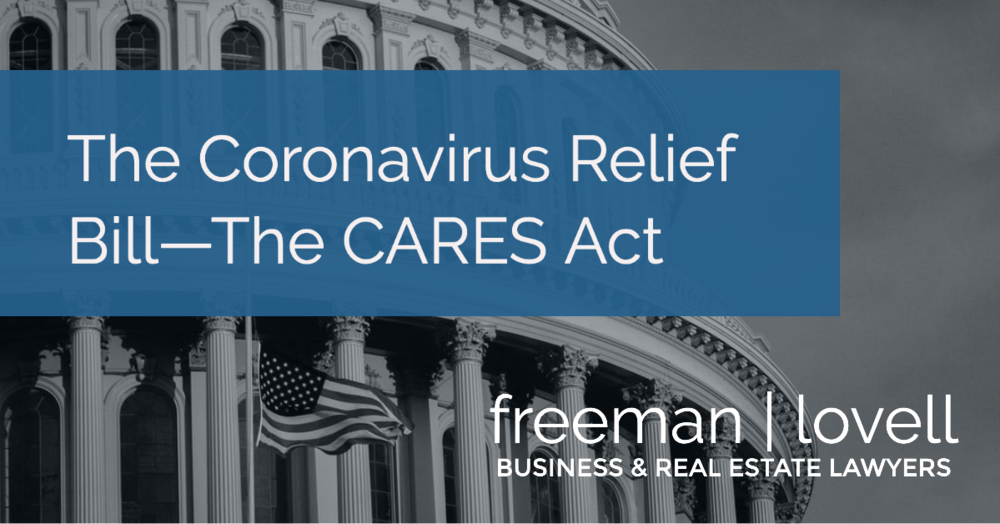
Entrepreneurs and small business owners have been among the hardest hit by this new economic reality. You are the heart and soul of the business community and survival is a must. We are here to be by your side and help you through this perilous time. Navigating all of the risks is not going to be easy, but we are going to stay on top of what is happening and do all we can to help you take the right risks to ensure that you not only survive, but position yourself to thrive once this storm passes!
Gratefully, some financial help appears to be on the way and there are many questions and uncertainty about what it really means. This is what we know now.
CARES ACT. The Senate and House have just passed a roughly $2 trillion coronavirus response bill (the "CARES Act") as a life preserver for the American economy to keep both individuals and businesses from drowning during this crazy time during which much of American life has halted. Now that President Trump has signed the CARES Act, below is what we can expect.
RELIEF FOR SMALL BUSINESS . In addition to the benefits to individuals, $377 billion dollars of the aid package is dedicated to small businesses which is going to be broken up in the following ways.
Paycheck Protection Program (PPP) Loans.
Amounts and Forgiveness. $350 billion of the $377 billion dollars will be used for potentially forgivable small business loans. Borrowers can borrower 2.5 times their monthly payroll expenses, up to $10 million. The amount of loan forgiveness may be modified or reduced if the employer decreases the number of employees as compared to the prior year, or if the employer reduces the pay of any employee by more than 25% as of the last calendar quarter. Employers who re-hire workers previously laid off as a result of the COVID-19 crisis will not be penalized for having a reduced payroll for the beginning of the relevant period.
Repayment Terms. Payments of principal, interest, and fees will be deferred for at least 6 months, but not more than 1 year. Interest rates are capped at 4%.
Limitations on Uses. Any portion of the loan that is used to keep workers on payroll for up to 8 weeks or pay rent, mortgage and existing debt could be forgiven, as long as the workers stay employed through the end of June. However a salary cap of $100,000 applies. These loans cannot be used for leave pay that is already covered under the Families First Coronavirus Response Act.
How Loans Will Be Distributed. These loans will be distributed through approved banks, credit unions and other lenders. It is unclear which lenders those will be and when they will start taking applications, but expect to see the common players in the SBA lending world being involved given the incentives that the government is giving to lenders to process and originate these loans.
Personal Guarantees and Collateral. No personal guarantees or collateral are going to be required for these loans.
ECONOMIC INJURY DISASTER LOANS (EIDLs).
The CARES Act is also expanding the eligibility requirements of small businesses and adding funding to the EIDLs program administered by the SBA. EIDL loans can be up to $2 million, have low interest rates, and long repayments terms.
There are EIDL grants as well. $10 billion of the $377 billion is dedicated for small business grants through the EIDL program of up to $10,000 to cover immediate operating costs. These grants are forgivable.
As long as you are not using the EIDL loan or grant proceeds for the same expenses as PPP loans, there is no restriction on getting both loan types.
You can apply for an EIDL by clicking here to get started.
EXISTING SBA LOAN RELIEF. $17 billion of that $377 billion will be dedicated to providing relief to small businesses that already have SBA loans. These funds will be used to cover 6 months worth of principal and interest payments. So if you have an existing SBA Loan, you may be in luck.
RELIEF FOR SOLO-ENTREPRENEURS AND FREELANCERS. In the past, self-employed people, freelancers, and independent contractors could not apply for unemployment. To account for those individuals, the bill adds a temporary Pandemic Unemployment Assistance program to help people who lose work as a direct result of the public health emergency through the end of this year.
REFUNDABLE TAX CREDITS. Employers are eligible for a 50% refundable payroll tax credit on wages paid up to $10,000 during the crisis. The credit will be available to employers whose businesses were disrupted and those that had a decrease in gross receipts of 50% or more when compared to the same quarter last year. This credit can also be claimed for employees who are retained but not currently working due to the crisis for all employee wages for firms with 100 or fewer employees.
CONCLUSION. We are watching these developments closely and want you to be aware of all the opportunities that are available to help you weather this storm. If you have any questions about this, you can reach out to any of our business attorneys. This summary has been compiled and prepared by Josh Freeman, Esq., who can be reached at josh@freemanlovell.com .
Stay healthy and strong! We’re here to help and guide you through!




